#Dylan Horrocks
Explore tagged Tumblr posts
Text

78 notes
·
View notes
Text
Dylan Horrocks, Alan Moore, Steve Grove and Dan Clowes: imagining comics that don't exist.
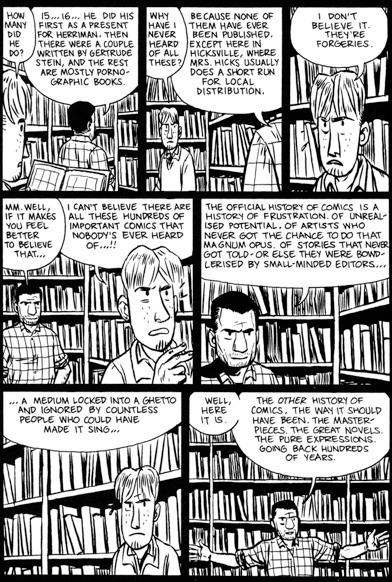
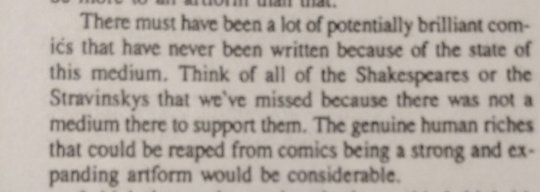
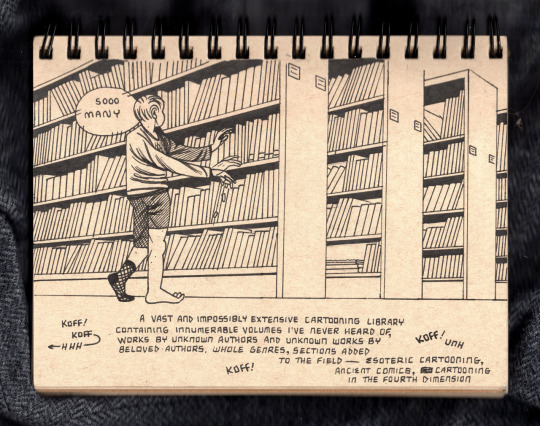

#GenuineHumanRiches#HereComeThoseTearsAgain#FallenTreesBringRepercussions#comics#Borges#Melancholia#dan clowes#dylan horrocks#steve grove#alan moore
288 notes
·
View notes
Text

May 2004. Speaking of "objectively deranged": In BATGIRL #50, Batman and Batgirl (Cassandra Cain) beat the crap out of each other, nearly get blown up, and end up almost drowning in the Gotham River (which all things considered is probably more dangerous than any of the rest). Batman's coterie of Bat-flunkies run around frantically trying to intervene, assuming that Bruce and Cass have been dosed with a new super-drug that causes homicidal rage, but Bruce later tells Barbara Gordon that wasn't the case at all:


"But it works"? Does it though, Bruce? Does it really?
#comics#batgirl#batgirl 2000#dylan horrocks#rick leonardi#jesse delperdang#batman#bruce wayne#cassandra cain#barbara gordon#oracle#parental abuse cw
31 notes
·
View notes
Note
You know, I was never a big fan of the post-Puckett Batgirl issues, but your analysis actually managed to breathe new life into them, great work!!
Wow, thank you so much! I definitely think Puckett has the least weak spots overall, and my ultimate fav issues will always come from early Batgirl (2000). Yet Horrocks and Gabrych both flesh out Cass in interesting directions, and I don't think her character would be the same without them.
Horrocks, for instance, gives us a lot of the gender exploration, as well as the fight with Babs, some nice Steph-Cass moments, the great Bruce fight, etc. Those are some defining moments for Cass and great examples of her growth.
Then Gabrych utilises Cass' voice the best out of any writer (in my opinion), really demonstrating how much she's learned since she had no internal monologue. We also get Tim interactions, a confirmation that Cass wants to be Batman, Brenda, learning Shiva's her mom, Steph death hallucinations, etc.
They both have contributed key pieces to our understanding of Cass today, and without editorial mandates their runs probably wouldn't have had so many flaws (like the very last issue, War Games, etc.). I think they deserve a lot of appreciation!
25 notes
·
View notes
Text
It's a shame the whole cruise ship bit during the Horrocks run was far more interested in showing off Cass in a string bikini than it was in actually building on any of genuinely interesting character stuff they briefly threatened to touch on. There's a lot of potentially fascinating character insight you could gain from a story actually delving into Cass' relationship with sex and her own sexuality. Not that I trust the same comics industry that thinks Mark Millar is what maturity looks like to get within a thousand miles of the subject.
26 notes
·
View notes
Text
It's kind of funny how the Horrocks run of Batgirl and the Gabrych run of Batgirl are polar opposites in the fact that Horrocks had a weak start but got better towards the end and Gabrych had a strong start but got kind of meh towards the end, lol.
Just a funny observation.
Fortunately for Gabrych I think you can blame most of the pitfalls of his run on editorial whereas I genuinely didn't think Horrocks understood how to write Cass at the beginning. 💀
27 notes
·
View notes
Text
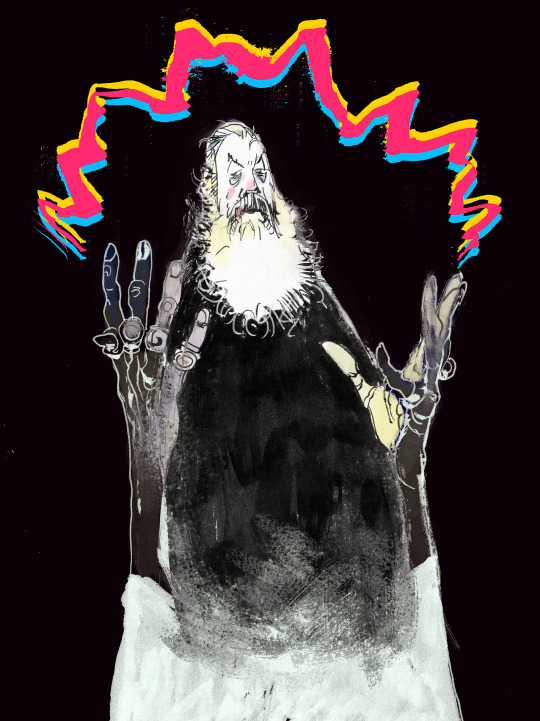

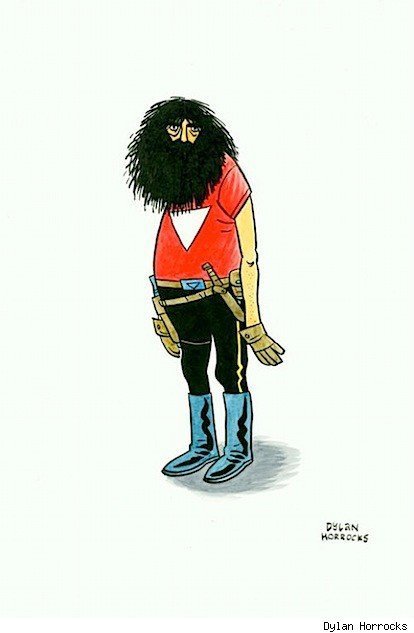
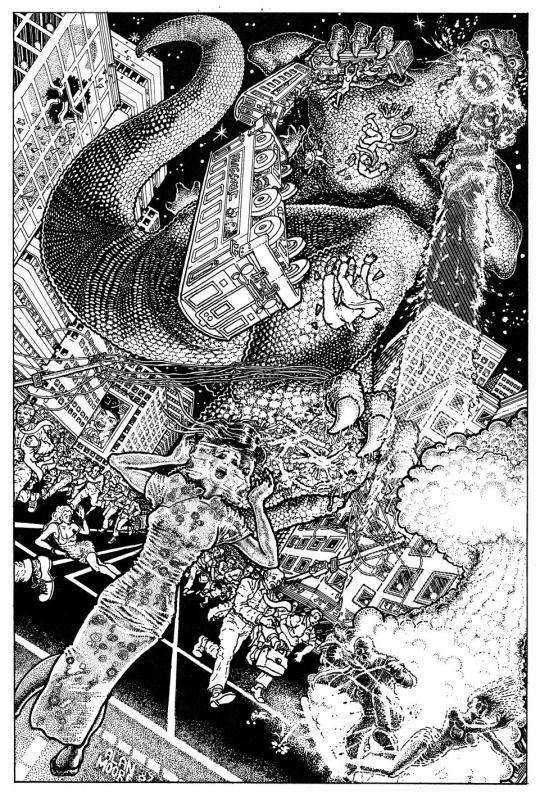



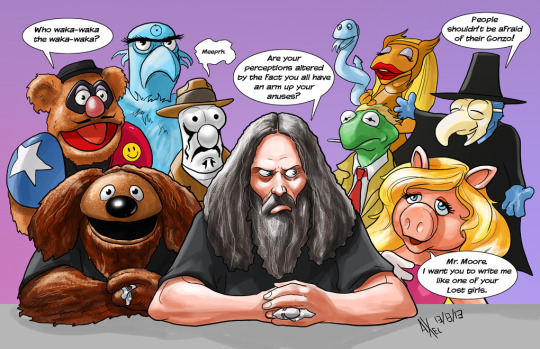


1) Alan Moore - Art by Matías Bergara
2) Alan Moore - BBC News
3) Alan Strong - Art by Dylan Horrocks
4) Godzilla Pin-Up - Art by Alan Moore
5) Alan Moore (1987)
6) Alan Moore - Art by Melinda Gebbie
7) Alan Moore And Jack Kirby
8) The Muppet Show With Guest Star Alan Moore - Art by Axel Medellin
9) Alan Moore
10) Alan Moore - Art by Andy Christofi
#Alan Moore#Comics#Watchmen#Tom Strong#Godzilla#Jack Kirby#Matías Bergara#Axel Medellin#Dylan Horrocks#Melinda Gebbie#Andy Christofi#Art
83 notes
·
View notes
Text








Happy birthday to Dylan Horrocks!
#comic book birthdays#comic books#comics#batgirl#hicksville#pickle#dylan horrocks#magic pen#hunter: the age of magic
3 notes
·
View notes
Text
okay so. Gabrych is the one who did the Shiva parentage retcon and started tying Cass back into the League of Assassins, which culminated in the One Who is All plot and Cass throwing away the Batgirl mantle and going back on the run after she killed Shiva in Batgirl #73. That ending then obviously connected up to Beechen's OYL Evil Cass plot via her going back to the League again and taking over Nyssa's sect, using justifications that linked back to Cain's history with the League and the One Who is All plotpoint from Gabrych's run.
But Gabrych and Beechen weren't the only ones making the calls in the Bat Office, and Death and the Maidens came out the year before War Games. So the work to kill Ra's and put Nyssa and Talia in charge of the League was already happening, and we know that Cass was being positioned to have a long-term part in that story even if the Evil Cass arc had never happened.
We also know that Dan Didio (who notoriously wanted Babs back as Batgirl) was already in charge of things by then and that Geoff Johns was writing Teen Titans (the original "public" justification for the Evil Cass arc was so Johns could use her as a Robin villain in TT03), so the concept development for the Evil Cass arc was probably already happening in the background as early as the end of the Puckett/Scott run.
So my longstanding theory is that the groundwork for the "remove Cass as Batgirl by making her a villain and doing LOA-based stories with her" agenda would have been laid even earlier if Horrocks hadn't been all 'screw that' about working with Bat editorial on War Games. Not sure how the Horrocks run would have been different otherwise, but I guarantee that the Batgirl issues of War Games, which laid the groundwork for the massive post-WG status quo change that was moving Cass from Gotham to Bludhaven and allowing her to operate independently, would have looked very different with his willing participation.
I actually have a longstanding conspiracy theory that if Dylan Horrocks hadn't been so anti-War Games as a concept his Batgirl run would have been used to lay some of the groundwork to advance the Evil Cass agenda
32 notes
·
View notes
Text
ok wait did geoff johns come up with the name conner bc the first time kon uses the name conner is in batgirl #41 which came out a few months before tt03 #1 🧐 who do i blame for this
#also though i'm almost certain that he was named conner for amanda conner who's an artist/writer and jimmy palmiotti's wife#was this decided back during the palmiotti run of sb94? was it picked by dylan horrocks during batgirl? did johns choose it beforehand???#was he named kon with the intention of naming him connor/er??#i need to know the behind the scenes info so i can complain accurately#p
1 note
·
View note
Text

23 notes
·
View notes
Note
Can you tell us more about Gabrych and the end of the 2000 run? Why was it cancelled?
Near the end of the comic book event "Infinite Crisis", Batgirl Vol. 1 was axed. This was not due to low sales (several DC Comics at the time were selling worse and continued on when the relaunch "One Year Later" program was to hit) but for a rather sexist reason.
Back in 2010, the inker for Batgirl Vol. 1, Jesse Delperdang, posted on Deviantart the real reason the series was canceled, "canceled to make room for the coming Batwoman."
That "coming Batwoman" was an ongoing series by Devin Grayson, and would never see the light of day (DC got cold feet when the character got more publicity than they realized and decided to retool the character (which we got with Greg Rucka and J.H. Williams III over in Detective Comics a few years later).
Because more than "one female bat comic" was one too many. Not only that but just last year Dan DiDio posted on Facebook the original outline he had for "OYL" regarding Cass:

Of course, DiDio always changed his mind and instead, we got the racist caricature in OYL. Nor would this be the last time DiDio would change his thoughts on what to do with Cass (2009, 2011, and 2016. Each a can of worms of themselves).
So that's why Batgirl Vol. 1 was canceled, due to sexism.
As for Gabrych, he continued to work with DC until an Omega Men mini in 2006-2007 and began to go back to his life outside DC Comics. He did come back to write a 2010 graphic novel Frogtown for the Vertigo label.
The thing is, DC Editorial under DiDio was a nasty business. Sometimes you followed the edicts or didn't and walked altogether (Kelley Puckett for a brief run with Supergirl Vol. 5 in 2008 and Dylan Horrocks with the "War Games" event when he and Grayson objected to Stephanie Brown being brutally murdered and DC taking away Babs from the comic too). Or you got nasty pricks in editing to deal with like Eddie Berganza (a noted DiDio toadie). It was just a toxic culture altogether, and I'm glad it is over when DiDio got fired in early 2020.
Two have left comics altogether (Puckett & Gabrych) and Horrocks is doing indie comic work in his native New Zealand, but avoiding the Big 2 after the "War Games" experience.
The sad truth is, if you write a Batgirl ongoing there's a 75% chance you're gonna get out of the industry. Literally, there's only a handful of Batgirl writers who've done stories on the ongoings and not left.
We just got Bryan Q. Miller back to DC in a few months (they're also reprinting the Batgirl Vol. 3 run he did), and that's probably cause most of the old regime left (see an SDCC 2020 Batgirls panel he was on with Sarah Kuhn and others where he goes onto a tale regarding his clashes with the heads over Cass).
Puckett did do a new foreword to his Batman Adventures run which got an Omnibus recently. So MAYBE there's hope for him too.
I hope I answered your question to the fullest on why Batgirl Vol. 1 ended and why Gabrych left the industry.
57 notes
·
View notes
Text
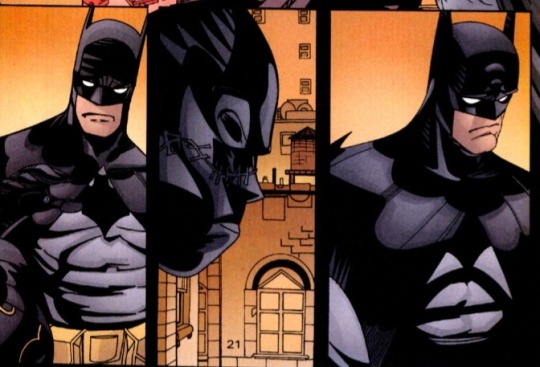
~ Batgirl (2000)
They are sad and disappointed in themselves and they should be. What they did is not justice.
So, I'm mad about this issue, like really mad for personal reasons I will explain later. For context: a young girl has been kidnapped by a thief who escaped jail. It's not the first time said thief kidnapps this girl. This young girl, around 10 years old, is an artist and her mother exploits her, making money by selling her daughter's art. They are rich. This woman doesn't love her daughter, she loves the money she is making from her daughter. The man that keeps kidnapping this young girl? Her father. Her father that loves and cares for her, that turned to crime to take care of his daughter, and refuses to sell any art she makes because she made it for him, because she loves her father. And she pleads, she pleads Batgirl to let her with her father and not bring her back to her mother who doesn't love her, she pleads her to not put her father in jail. And what do Batgirl does? She stops the father, gives him to the cops and brings back the girl to her mother. On those panels, they are looking at a sad child with her abuser they brought her back to.
My mother doesn't love me. She will say she does to others, but it's not true and it has been the case for a long time, since I was very young. I wasn’t unwanted, I was just not what she wanted. My life was supposed to be centered, until my death, around taking care of my mother (she is not disabled or anything, she just wants people to do everything for her). Raised to make money I would gift to my mother, so she could have luxuries, but I was not successful in that. I grew up pleading for love, pleading for people to listen to my pain. Nobody did. I learnt that people prefer the comfort and peace of their lives over helping others. I learnt to distrust authority figures (teachers, doctors, any adults/people at least 5 years older than me in general), because either they were power hungry assholes who abuse kids, either they preferred to look away, who would tell me to be nice and listen to my mother. It's too much problem to help children. In the end, I could count on nobody but myself to get out. I can count on nobody but myself. I hate the system, and I promised myself I would never be like those who look away, I will defend any child that needs it.
So, to read a story where a little girl pleads a HERO to not bring them back to their abuser, only for said HERO to still bring her back to her abuser, to tell her to be nice and stay with her awful parent... I am furious. This issue is literally telling me that, if heroes existed, the heroes you adore since you are a child, they would not have saved you. They would have bring you back to your mother and told you to be nice, like everyone else. They would have let you go through those years of pain. Heroes would have looked away.
What is the logic here? Because it's neither justice or the good thing to do. That it is the law? Since when do they follow the law? I don't remember vigilantism being legal, or assault and battery, or owning all the weapons Bruce owns. Yes, it was still a kidnapping, her father is a criminal, it would not have been a good life for a child. But, the Bats could have tried to find a solution, instead of simply giving this child back to someone who will treat her like shit.
I know it's just a fiction, so it's not like a real child is being exploited and will be more abused later when she stops being good enough because her mental health deteriorated, nobody is going to become depressed and lose trust in heroes because the bats brought her back to her awful mother. And also, it's not the characters who are at fault, it's the writers. It's not about Cass and Bruce being bad people heroes, it's about who the fuck decided to write that. New entries in my list of enemies, Keller Puckett and Dylan Horrocks.
#batman#bruce wayne#batgirl#cassandra cain#dc comics#my ramblings#and let's not even talk about the takistan storyline after that because I'm also mad at this#propaganda telling you that the people defending themselves against a violent gov are as bad as their gov#no a war criminal planning a genocide because that's what is going on is way more bad than the “terrorists”#reading this with what is going on rn in Palestine was a ride#“we don't do politics” than let the guy kills the war criminal who is genociding his people Bruce let him#it's not like justice will stop a gov from doing what they are doing if you don't stop it nobody else but those “terrorists” will let them#I'm furious I cannot even explain how much I'm mad#Screaming crying breaking shit like I'm Jason Todd high on pit's madness
25 notes
·
View notes
Text
The Evolution of Cassandra Cain's Dialogue
Since Batgirl #1 is out and thriving, I thought it'd be fun to dive into the history of Cass' dialogue throughout different writers/runs. This is not comprehensive - I'll miss some writers, but I'll be covering her generally most known runs in mainline continuity (so no DCeased, Shadow of the Batgirl, etc.). Not a linguist by any means, so linguists on here feel free to chime in! (I'll also give opinions on which interpretations I personally prefer at the end).
Without further ado, we'll start at the beginning:
Kelley Puckett - Batgirl (2000)

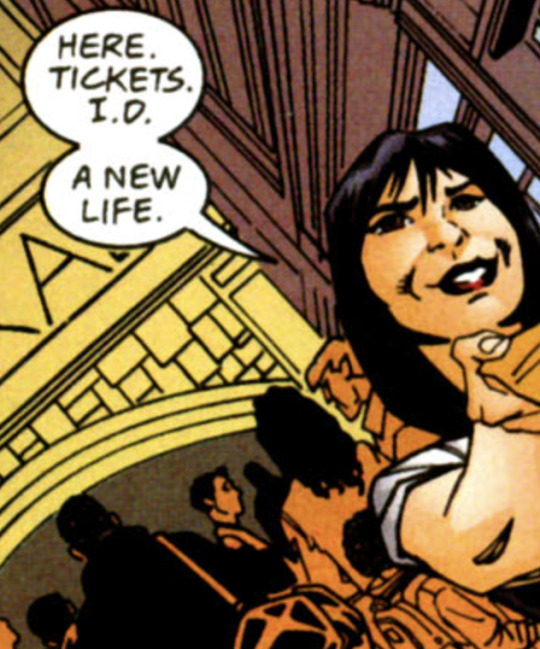

Pre-issue 4, Cass speaks minimally in one-word sentences and doesn't have internal narration. Post-issue 4 (when a metahuman changes Cass' brain), she develops an internal monologue and begins to speak longer sentences. I'm splitting Puckett's Cass dialogue into 3 stages: early, middle, and late.
Early (#4 - #12): Cass speaks short, fragmented sentences. Each word has an ellipses between them (panel 1 above, from #7).
Middle (#13 - #24): Cass continues to speak incomplete sentences (often missing a subject or pronouns), but without ellipses (panel 2, from #13).
Late (#25 onwards): Cass begins to speak complete, simple sentences, punctuated by a few ellipses (panel 3, from #33). She continues to speak grammatically (though slowly) throughout the final part of Puckett's run.
Dylan Horrocks - Batgirl (2000)


Horrocks writes very similarly to late-Puckett, with Cass speaking in full, simple sentences, punctuated by the occasional ellipses. Horrocks introduces two new elements to her dialogue:
Cass stutters, sometimes repeating a word or phrase at the beginning of a sentence (panel 1 above, from #39). This is mostly used in the earlier parts of Horrocks' run.
She quotes reality TV (panel 2, from #51).
Maybe because of the reality TV, Cass also speaks more colloquially here than in Puckett's run, using phrases like "come 'n' get it" (from #57).
Andersen Gabrych - Batgirl (2000)

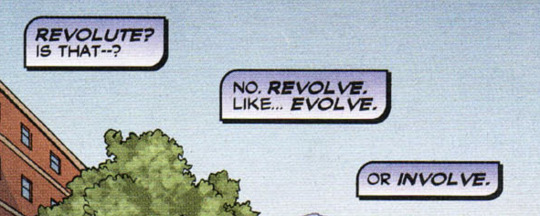
Gabrych's run focuses heavily on Cass' dialogue. Panel 1 above, from #58, suggests her narration boxes are another form of dialogue - Cass is speaking into a recorder. Several features of Gabrych's Cass dialogue are:
Ellipses: Even more than his predecessors, Gabrych scatters ellipses throughout Cass' speech (panel 1).
Fillers: Cass extensively uses filler words such as 'uh', 'um', and 'like' (panel 1, panel 2 from #61).
Longer sentences: Cass is more talkative and speaks longer sentences (panel 1, which is basically more words per panel than Puckett and Horrocks combined).
Wordplay: Cass often ponders definitions and word structures (panel 1, 2).
Adam Beechen - Batgirl (2008)
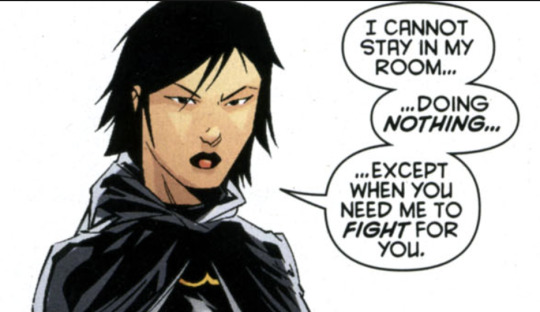

After evil Cass (that dialogue is not worth discussing), Beechen gets another chance with Cass in this miniseries. More than any other writer, Beechen differentiates Cass' internal monologue from her dialogue - her narration boxes are much wordier than her speech.
Her dialogue is a more loquacious version of late-Puckett or Horrocks: full sentences interspersed with ellipses (panel 1, from #1). The ellipses drop off towards the end of the series.
Her narration boxes use a variety of sentence structures and vocabulary. They read more or less as fluent English (panel 2, from #4).
Scott Snyder - Gates of Gotham (2011)
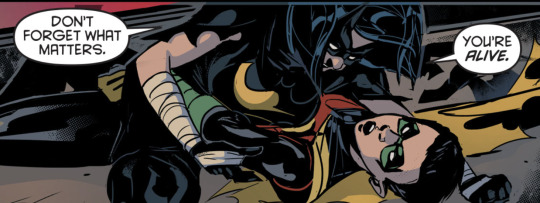

Snyder's Cass somewhat resembles mid-Puckett, using short sentences without ellipses (panel 1, from #2). She speaks a fair amount, but is more taciturn here than in any previous run. This is partially due to her not having narration boxes.
A unique feature of Snyder's Cass is preferring formal to informal speech. Though she uses contractions (panel 1), she goes large stretches without them (panel 2, from #3). She also omits the subject of a sentence only once in 5 issues, whereas native speakers (like Dick) drop the subject all the time ('have you ever been to Paris?' vs. 'ever been to Paris?'; Snyder's Cass would always say the former instead of the latter).
Sidenote: Batman & Robin: Eternal (2015)
Quick note about B&R:E: Cass is reintroduced into canon after being erased by the New 52, which means she's back to having very limited language ability. The series is scripted by multiple people, so it's hard to analyse. Suffice it to say she speaks in monosyllabic words, at most a short, incomplete sentence, but is mostly silent.
James Tynion IV - Detective Comics (2016)

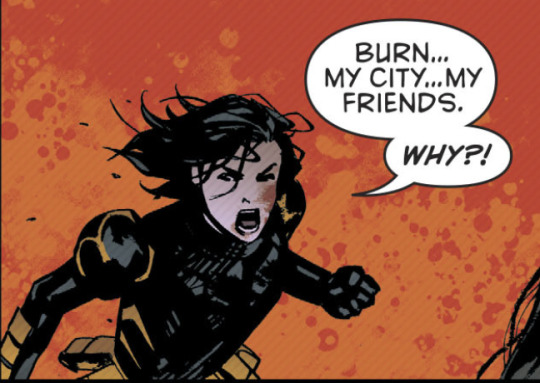
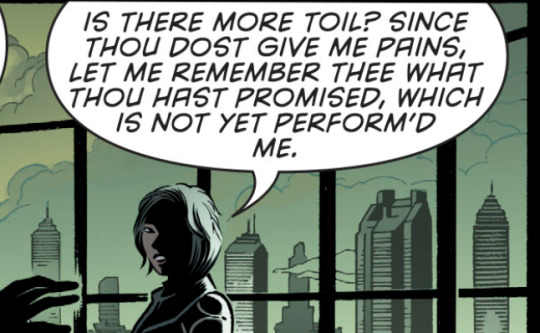
Because Cass' language ability has been reset, Tynion develops her speech along the lines of Batgirl (2000).
Early Tynion has Cass speaking single word sentences (panel 1, from #938). Very similar to pre-metahuman touch Cass in BG (2000).
During the League of Shadows arc, Cass begins to speak a few words at a time, often separated by an ellipsis (panel 2, from #956).
Afterwards, Cass' friendship with Basil Karlo blossoms, leading to this run's most distinctive language feature - Cass improves her speech via studying and quoting Shakespeare (panel 3, from #958). Her improvement is reflected in the rest of the run through speaking longer and more frequent sentences.
Bryan Hill - Batman & The Outsiders (2019)
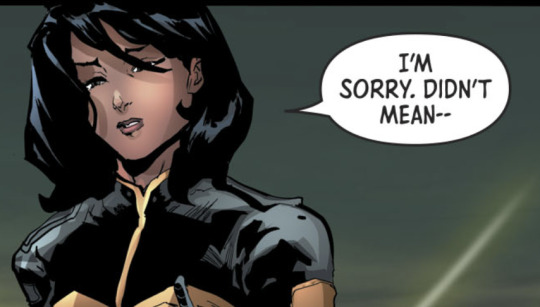
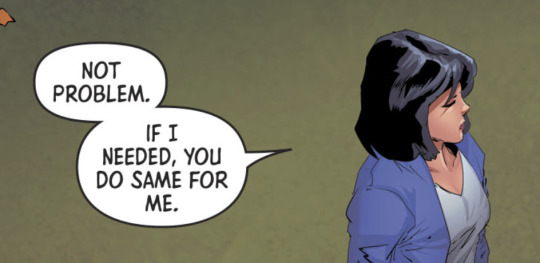

Like other writers, Hill's Cass generally uses short, simple sentences. She frequently drops the subject or pronoun in a sentence (panel 1, from #1). Hill doesn't use ellipses to separate the sentences, opting for periods most of the time.
Cass sometimes omits other words from her sentences too, dropping articles like 'a' and 'the' (panel 2, from #4), prepositions like 'to', and verbs like 'is' (panel 3, from #9). This peters out in the second half of the run.
Becky Cloonan and Michael W. Conrad - Batgirls (2022)

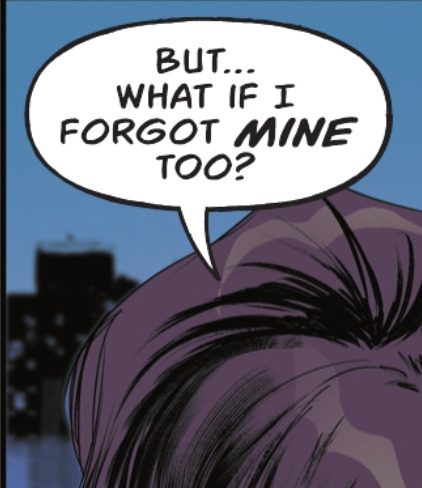
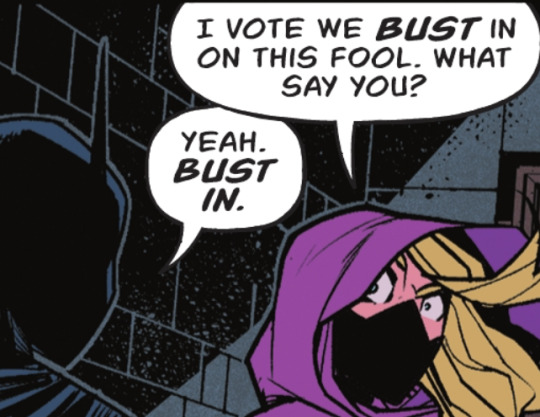
Similar to mid-Puckett, Batgirls has Cass speak mostly in short, 1-2 word sentences (panel 1, from #2). Cloonan and Conrad occasionally use ellipses as well, though mostly for emphasis/natural hesitation rather than indicating a unique speech pattern (panel 2, from #7).
Cass also has a habit of repeating/echoing a phrase Stephanie says (panel 3, from #16). This might be more of a friendship thing than a speech thing, though.
Alyssa Wong - Spirit World (2023)
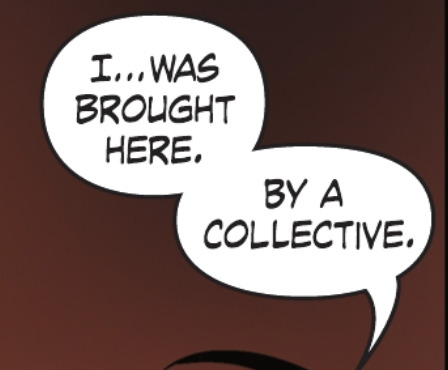

Wong's Cass uses short sentences sometimes interrupted by ellipses, like late-Puckett and Horrocks (panel 1, from #1). Generally, if the sentence is three words or less, there won't be an ellipsis (panel 2, from #5).
Kelly Thompson - Birds of Prey (2023)

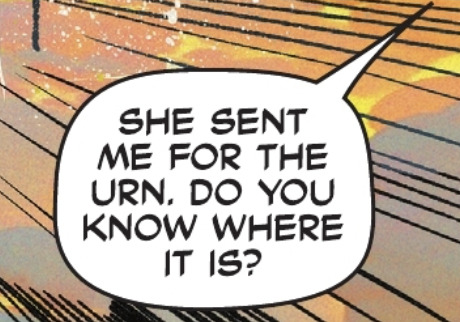
Thompson's Cass draws on a lot of previous iterations, but is somewhat unique as a whole. Some elements of BoP Cass include:
She speaks in sentences of varying lengths, but rarely with more than one clause (panel 1, from #1). Thompson is more strict about not using commas with Cass than most other writers.
Cass is a little more talkative (panel 2, from #5). Her sentences are fairly lengthy compared to most other runs, and she doesn't always opt for the shortest way to say things ('where is it?' instead of 'do you know where it is?'). Thompson also doesn't use ellipses, which adds to the sentences feeling longer/more complete.
BoP is ongoing so Thompson may add more to her speech.
Sidenote: Ram V - Detective Comics (2023)
Putting this in a sidenote since there's not much to say, but Ram V takes after mid-Puckett, with Cass using shorter, incomplete sentences. Cass almost always omits the subject of a sentence; her dialogue is as short as possible while retaining clarity.
Thoughts
Because Cass' language disability is a core part of her character, but learning to speak is also a core part of her character, I prefer writers who emphasize her unique speech patterns without reducing her range of expression. My favourites are:
Gabrych - by far the person who put the most effort into his dialogue, Gabrych-Cass has such a vibrant, distinctive style of speaking. The narration boxes, Cass' wordplay, and the use of fillers and ellipses all combine for a speech style that highlights her disability without reducing her to it.
Puckett/Horrocks - combining because they are really very similar. Puckett and Horrocks both use ellipses to great effect, and is a great style to emulate for Cass in an earlier stage of life. Horrocks' use of reality TV is severely underutilised. Puckett, of course, is the gold standard for typical Cass dialogue - if Gabrych's style is a little too much, Puckett and Horrocks are the way to go.
Tynion - mostly because of the Shakespeare thing. It's such a beautiful and clever way of showing her progress, and the amount of symbolism you could do with Cass quoting Shakespeare is unmatched.
I don't super enjoy the more talkative Casses (Beechen, Thompson to an extent), though I kind of like Snyder's take because there's a sense of Cass being very careful with her speech there. If you're writing Cass for a fanfic or something, I would avoid Hill's Outsiders; the run is great, but Cass' ungrammatical speech is unusual and doesn't jibe with the rest of her depictions. Ram V and Wong are relatively good depictions to draw from though.
Of course these are my opinions! I may have gotten some things wrong/overgeneralised stuff, so take all this with a grain of salt. All you need to know is you should read Batgirl (2000) :).
#cassandra cain#batgirl#batman#meta#this took me so stupidly long#i didn't even include batgirl (2024) since it's only one issue but I might add on later#anyway more people need to emulate gabrych#so many are clearly influenced by puckett but gabrych's dialogue is so unique to cass and works nicely with her development#i also wish more people would use the reality tv/shakespeare stuff#cass spouting off the crassest phrase and then 'dost thou' in the same sentence
329 notes
·
View notes
Text
batgirl issue forty-five where cass asks to see barbara's batgirl costume and barbara's all "oh yeah I loved being batgirl every guy found me soooo sexy, especially nightwing!" and cass takes the suit for a spin and tim sees her and is all ''uhhhhh batgirl have you done something different you're sooooo hot right now." how can I find a hand-me-down copy, get a cheap ticket to new zealand, and track down dylan horrocks so that I can burn it right in front of him? asking for a friend.
#talking to the void#my thoughts#dc#dc thoughts#dc comics#batgirl (2000)#cassandra cain#barbara gordon
20 notes
·
View notes
Text
Casspoll!
Okay I really had to think about this one and I quickly dipped into the runs I have not touched yet rather than just using their reputations:
Kelley Puckett – It’s Puckett. He created Cass. Some of her very best stories happened here – the first two Shiva fights, delivering a man’s final wishes, Nobody Dies Tonight, Thicker than Water. The absolute heart that Cass cannot allow people to be killed hits hard here. She’s still learning about what a society is.
Dylan Horrocks takes Cass and her growth and lets her mess up and brings Bruce and Barbara more into conflict over what Cass needs, but also allows Cass to be in conflict with them over what she wants. It has the Ivy twofer “The City is a Garden/The City is a Jungle” which I think is Horrocks’ best plot. It has Tough Love, where Bruce and Cass have their conversation over what the Bat means to Cass. It has Cooking the Books, where we see the abrasive side of Barbara’s personality come out and hurt her relationship with Cass. It has Cass taking her first steps into relationships, with her attraction to Tai’Darshan and Kon. It’s a messier, more complicated time.
Andersen Gabrynch has the best conversation of Fresh Blood with Tim over their life goals and their reflections on War Games. He has Destruction’s Daughter/Blood Matters and everything that comes with the culmination of that storyline. He gives Cass her first taste of civilian life. Gabrynch is the ‘how far will Cass go’ writer.
Adam Beechen: you’re all mean! Oh Beechen. He screwed up first time around, no question, but I continue to maintain he did useful things with Cass in Batgirl 2008. He brought in the chance to parallel Slade and Rose’s relationship with David and Cass’. He worked hard to find fixes for the mistakes he made. And if Fresh Blood set up the situation where we saw Tim and Cass become closer and start establishing a sibling-like relationship, then Beechen solidified it to the point that it was expected from that point onwards.
Joe Kelly: oh, Justice League Elite. You are certainly a story. I think the most important thing Kelly actually did in JLE was when Cass stabbed Kendra. It broke her. There is some beautiful writing in JLE surrounding Cass basically sobbing to Bruce over this incident, and Bruce promising her that she doesn’t have to stay undercover, he’ll pull her out, her happiness is more important to him than this mission, and Cass refusing to be extracted. And Ollie remaining there the whole time to keep an eye on Cass on Bruce’s behalf. It’s such a good paternal moment on both Bruce and Ollie’s parts, and they so very rarely get them in concert. It’s also a moment of growth in Cass that is rarely referenced, because as I must repeat, it happens in JUSTICE LEAGUE ELITE.
Bryan Hill: I have heard good things! And immediately on picking it up and going through the first three issues I saw the exact thing I’d enjoyed and wanted more of from Dixon’s 2008 BatO run – Tatsu working with and mentoring Cass – which is a solid recommendation in itself. Will 100% be coming back to this when I get up to this era in my reading.
Becky Cloonan and Michael Conrad: I dipped into #1 and #14. It suffers from the modern era problem of light and bright fluffy content without a solid base behind it. Also the fact that the writers didn’t initially realise that two of the characters they were assigned were ADULTS and were writing them that immaturely is certainly not reassuring. Um. I also know I’m not fully across modern era Cass yet, but #14 seems to miss something that’s basic to my understanding of Cass – talking can be hard but READING is harder. Cass not talking but having reading comprehension showing up constantly? It feels off. (Also I’m fascinated in how an issue like Batgirls #1 manages to be that off while still managing the Cass shower robe scene, which to my eye echoes and references the BatO 2008 Cass shower scene. Suspect they just got lucky and I’m reading too much in)
Mariko Tamaki: okay I have not yet read Shadows of the Bat: The Tower, but I have read Sounds, so I’m basing on that. Tamaki really seems to get Cass, her hand with the character work in Sounds hit some very fundamental parts of Cass’ character and struggles, and I really enjoyed it.
Overlooked: ALYSSA WONG. Wong’s work with Cass in Spirit World not only has been busy recanonising a bunch of things from Batgirl 2000, but is touching on some central aspects of Cass’s view of killing and death in beautiful resonance of things originally established by Puckett. Also it’s given Cass some narrative space back on her own, and while I think Cass’s relationship with Steph is important, I also think she’s more functional and useful to DC writers when she’s not assumed to be part of an automatic pair.
Plus a plug for Scott Snyder for Gates of Gotham and giving us proper insight into the Reborn era Cass relationships with her brothers.
46 notes
·
View notes